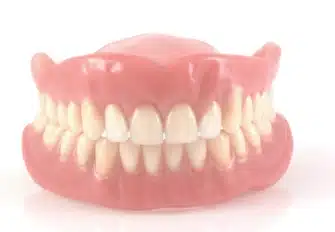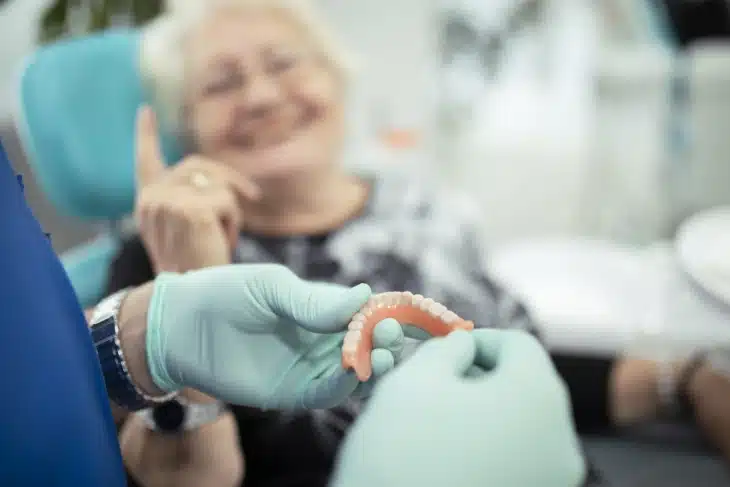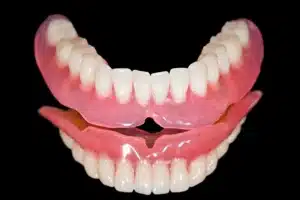Dentures are prosthetic devices designed to replace missing teeth, provide support for facial muscles, and enable individuals to eat, speak, and smile confidently. However, for many new denture wearers, a common concern is whether they can eat normally with dentures. The good news is that, with proper care and adjustment, eating with dentures can be quite comfortable and enjoyable. Let’s delve into the factors influencing eating with dentures and discover tips for a seamless bite experience.
Factors Affecting Eating Comforts with Dentures
Proper Fit:
The fit of dentures plays a significant role in determining whether one can eat normally with them. Ill-fitting dentures can lead to discomfort and instability while eating, making it challenging to chew food properly. Dentures that are loose or do not properly adhere to the gums can cause irritation and sore spots, hindering the ability to eat comfortably.
Adjustment Period:
New denture wearers often experience an adjustment period where they need time to adapt to wearing dentures. During this time, the muscles of the mouth and jaw may need to learn how to work with the prosthetic teeth, affecting eating habits. This adjustment period can vary from person to person, but with patience and practice, most individuals can gradually regain their ability to eat normally with dentures.
Oral Health:
The overall oral health of an individual can impact their ability to eat normally with dentures. Poor gum health or underlying dental issues can affect the stability and effectiveness of dentures during eating. Additionally, inadequate oral hygiene practices can lead to gum irritation or infections, further complicating the eating process. It is essential for denture wearers to maintain good oral hygiene habits and seek regular dental check-ups to ensure optimal oral health and function with their dentures.
Tips to Eat with Dentures

Eating with dentures can initially feel unfamiliar, but with practice and these helpful tips, you can enjoy meals with confidence and ease:
Start Slowly:
Begin by consuming soft or easily chewable foods like mashed potatoes, yogurt, or scrambled eggs. As you become more accustomed to wearing dentures, gradually introduce firmer foods into your diet.
Chew Evenly:
Distribute food evenly on both sides of your mouth to prevent discomfort and instability. Chewing evenly also helps to maintain balance and stability while eating.
Use Adhesive:
Utilize both sides of your mouth to chew food evenly. This prevents uneven pressure on your dentures and reduces the risk of them slipping or becoming dislodged.
Cut Food into Smaller Pieces:
Cut larger or tougher foods into smaller, more manageable pieces to make chewing easier and reduce strain on your dentures.
Avoid Sticky Foods:
Sticky or overly chewy foods like caramel or chewing gum can adhere to your dentures, causing discomfort and difficulty in chewing. Opt for softer alternatives to minimize the risk of food particles getting stuck.
Take Small Bites:
Take smaller, manageable bites of food to reduce the strain on your dentures and make chewing more comfortable. Avoid biting into large or hard foods directly, as this can increase the risk of denture displacement.
Practice Proper Oral Hygiene:
Maintain good oral hygiene by cleaning your dentures after meals and thoroughly brushing your gums and tongue to prevent bacterial buildup. Proper oral hygiene not only keeps your mouth healthy but also helps prolong the life of your dentures.
Use Denture Adhesive:
If you experience persistent denture movement or discomfort while eating, consider using denture adhesive. This adhesive can improve the stability of your dentures and provide added confidence while eating.
By following these tips and gradually adjusting to eating with dentures, you can enjoy a varied and nutritious diet while maintaining comfort and confidence in your prosthetic teeth.
What are Good Foods for Dentures?
Good foods for denture wearers encompass a range of options that are soft, easy to chew, and gentle on the gums. Soft fruits like bananas, ripe berries, and peaches are excellent choices as they require minimal chewing and are packed with nutrients. Cooked vegetables such as steamed carrots, mashed potatoes, and well-cooked squash provide essential vitamins and minerals without requiring extensive chewing. Dairy products like yogurt, pudding, and cottage cheese offer a creamy texture that is easy to consume with dentures while also providing calcium and protein for oral health. Tender meats like chicken, fish, and ground beef are preferable over tougher cuts, ensuring a smoother eating experience. Additionally, eggs in various forms, including scrambled, boiled, or as omelets, offer a protein-rich option that is gentle on the gums. Soft bread varieties and crackers are suitable for sandwiches or snacks, especially when paired with soft spreads like peanut butter or cream cheese. Soups and stews filled with soft vegetables, beans, and tender meats are comforting and easy to eat, making them an excellent choice for denture wearers. By incorporating these good foods into their diet, individuals can enjoy a varied and nutritious meal plan while maintaining comfort and functionality with their dentures.
Foods to Completely Avoid
While some foods are suitable for denture wearers, others can pose challenges and should be avoided to prevent discomfort or damage to the prosthetic teeth. Here are some types of foods to completely avoid:
Hard Foods:
Foods that are hard or require extensive chewing, such as nuts, hard candies, and raw vegetables like carrots or apples, should be avoided. These foods can exert excessive pressure on dentures, increasing the risk of damage or dislodgement.
Sticky Foods:
Sticky or chewy foods like taffy, caramel, and chewing gum can adhere to dentures, making them difficult to clean and causing discomfort. Avoiding these foods helps prevent them from getting stuck to the dentures or causing irritation to the gums.
Tough Meats:
Tough cuts of meat, like steak or pork chops, can be challenging to chew with dentures and may require excessive force, leading to discomfort or instability. Opt for tender meats or alternative protein sources that are easier to chew and digest.
By avoiding these types of foods, denture wearers can minimize the risk of discomfort, damage, or instability while eating and maintain the longevity and effectiveness of their prosthetic teeth.
Foods and Drinks That Stain
Certain foods and beverages can have a staining effect on dentures, potentially affecting their appearance over time. Among these are coffee and tea, both known for their dark hues and high tannin content, which can lead to discoloration. Red wine, with its chromogens, and dark-colored berries like blueberries and raspberries also pose staining risks. Additionally, soy sauce and curry, rich in pigmented compounds, can contribute to denture discoloration if consumed frequently. Dark sauces, such as barbecue sauce and balsamic vinegar, are also culprits, along with sodas and fruit juices. Denture wearers should be mindful of these staining agents and consider moderation or rinsing with water after consumption to minimize staining effects and preserve the appearance of their dentures. Regular cleaning and proper oral hygiene practices are essential for maintaining the aesthetics and longevity of dentures.
Returning to Your Normal Foods
After getting accustomed to wearing dentures and adjusting to eating with them, many individuals may wonder when they can resume eating their favorite foods. Returning to your normal foods is possible with dentures, but it’s essential to do so gradually and mindfully. Start by reintroducing softer versions of your favorite foods, such as well-cooked vegetables, tender meats, and soft fruits. As you become more comfortable chewing with dentures, gradually incorporate firmer textures and tougher foods into your diet. Take your time and listen to your body’s cues, avoiding foods that cause discomfort or instability with your dentures. Remember to practice good oral hygiene, including cleaning your dentures after meals and maintaining regular dental check-ups, to ensure their longevity and effectiveness. By gradually reintroducing your normal foods and paying attention to your denture comfort, you can enjoy a varied and satisfying diet while wearing dentures.
Conclusion - CTA
Mastering eating with dentures requires patience, adaptation, and informed food choices. By avoiding damaging foods, embracing softer options, and gradually reintroducing normal foods, denture wearers can enjoy meals comfortably. Prioritizing oral hygiene and seeking regular dental check-ups ensures denture longevity. For personalized dental care, visit Normandale Dental. Schedule your appointment at Normandale Dental for a healthier smile.





